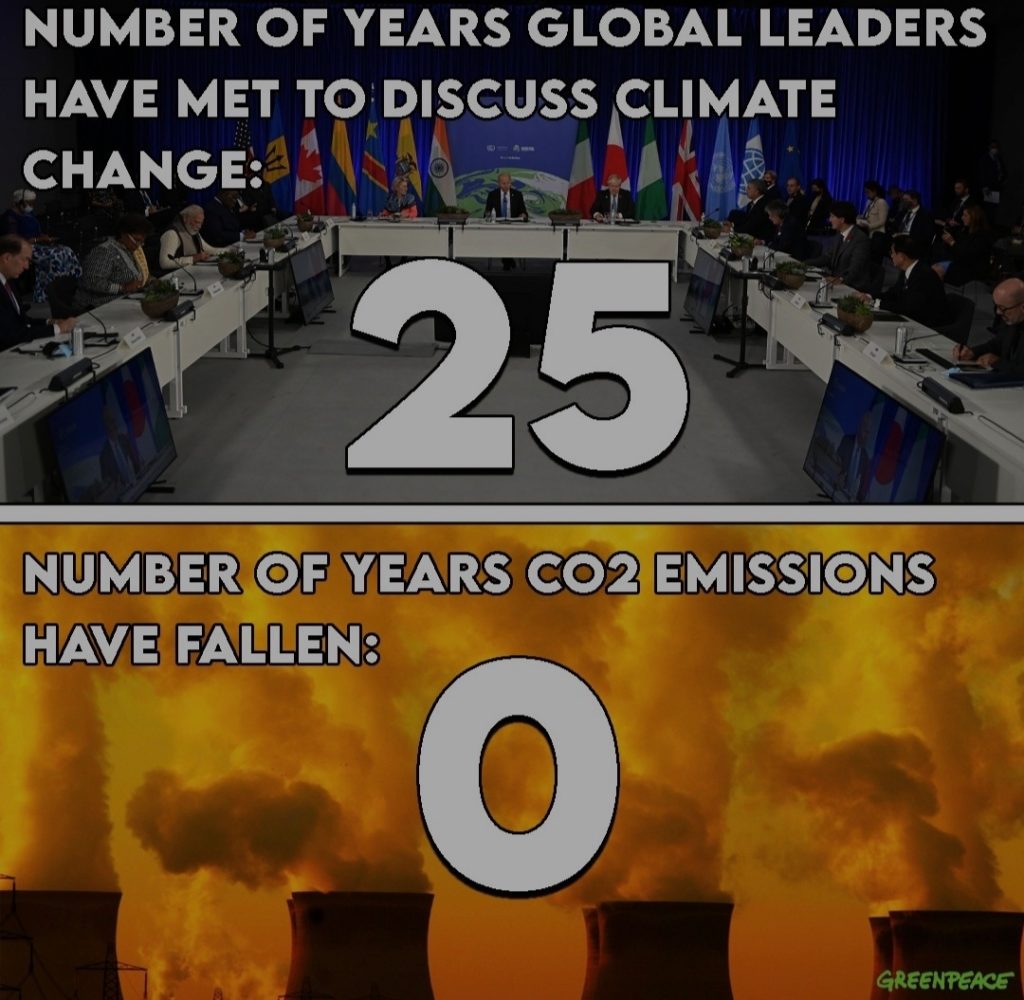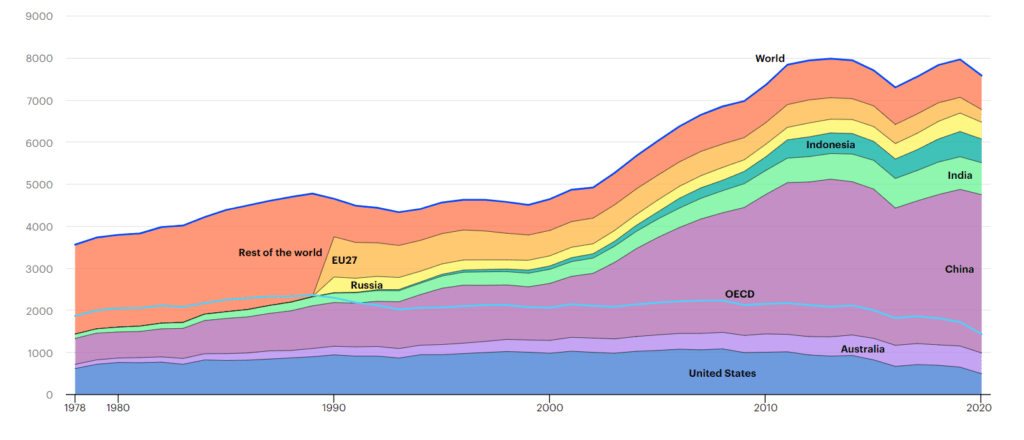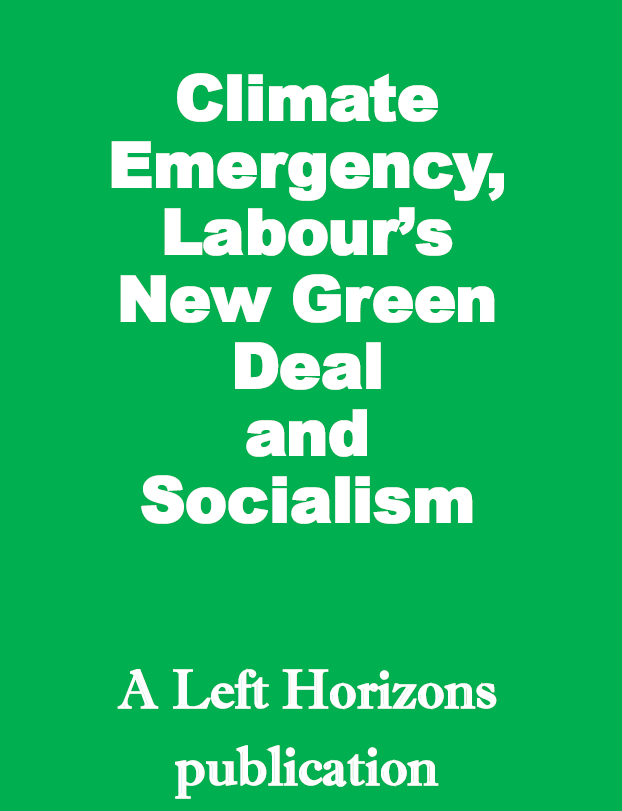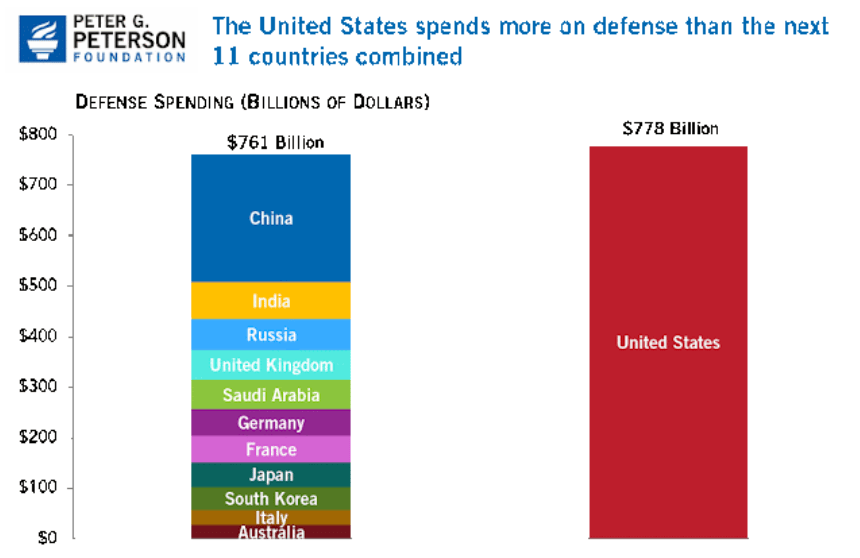The two biggest barriers to human progress are the private ownership of the means of production, distribution and exchange and the continuation of nation states. These features of modern society are not only obstacles to human development but are in fact the drivers of the looming climate catastrophe and are the reason why the COP 26 conference will fail to make any meaningful impact on climate policy.
According to the Unite Nations Emissions Gap Report, the pledges that were made by various states since the Paris climate ‘agreement’ will not be enough to keep the average global temperature rise (compared to pre-industrial levels) below 1.5oC. All the countries that signed the Paris agreement were supposed to bring forward “national climate pledges”, but according to the UN report, “new national climate pledges combined with other mitigation measures put the world on track for a global temperature rise of 2.7°C by the end of the century”.
The report concludes that the pledges made for carbon emissions by 2030 amount to only a 7.5% cut. We should be under no illusions: a global temperature rise of 2.7oC would be catastrophic.
Big increases in greenhouse gases in last ten years
Despite the collapse in the world economy as a result of Covid, the World Meteorological Organisation reports that there was no evidence of a reduction in atmospheric carbon dioxide during the pandemic. In the last ten years, although there are supposed to have been carbon-reduction measures in place, there have been increases in atmospheric CO2, methane and nitrous oxide, all greenhouse gases.

In 2015, which was the year the Paris accords were agreed, atmospheric emissions of greenhouse gases from all human activity amounted to nearly 47bn metric tons. By last year, it had risen to an estimated 52bn metric tons. There has been no progress made, in other words. The promises and pledges that have been made are at best minimal and token measures.
It is notable that one of the world’s greatest emitters of greenhouse gases, China, has been absent from the COP26 conference. China has set relatively modest carbon reduction targets, and will continue to open new coal mines and burn huge quantities of coal for decades to come. This is also true of India, which has made pledges nowhere near enough to cut its emissions by any meaningful amount.
Although Joe Biden has been quick to criticise the Chinese for their absence and the Indian government for its modest reduction targets, in fact per head of population, the USA is still the biggest emitter of greenhouse gases and will remain so for decades. Even as Biden was attending the Glasgow summit, behind the scenes he was lobbying furiously for the world’s big oil producers, notably Saudi Arabia, the United Arab Emirates and Russia, to increase production to bring down oil prices.
Rich countries not prepared to share technology with poorer countries
It is the height of hypocrisy for the industrially developed countries in the affluent North to criticise those less economically developed countries in Asia and Africa, when those same rich countries are not prepared to share their wealth and technology for global green development. They have not been prepared to share Covid vaccine technology, despite the obvious risks of retaining a ‘pool’ of coronaviruses in different parts of the world: far less are they willing to share technology and finance investment in renewable energy.
There were commitments made in the past for the richer countries to provide annual aid of £100bn, to help poorer countries reduce carbon emissions, but those commitments were not met and may not be (if at all) before 2023. This is particularly galling for those countries that are least well developed economically – and are therefore the least responsible for climate change – but which will suffer disproportionally more. The 54 countries of Africa, for example, are only responsible for around 4 per cent of global carbon emissions but are already suffering from intensifying extremes of weather.
None of the governments represented in Glasgow can be trusted to make sincere pledges to reduce emissions. To one degree or another they are all jockeying for favourable publicity and kudos, meanwhile protecting the prestige, power and influence of their own ruling elites. Behind the scenes, these political leaders are all in the pockets of big business and other ruling interests. In public speeches, it is a case of “I’m first”, but in private it is “no, after you”.
Several big producers of oil and coal are among those countries lobbying hard in favour of ‘carbon capture and storage’. This is a technology still is in its infancy, untested on a large scale and expensive, but it provides a technological ‘fig-leaf’ and therefore a ‘justification’ for continuing to produce vast quantities of fossil fuels for the world market.

Likewise, countries that export a lot of meat, such as Brazil and Argentina, have lobbied UN and climate agencies against any wording in reports that might suggest a need to shift diet towards plant-based foods. This is despite overwhelming evidence that global meat production is a powerful driver of carbon dioxide and methane emissions into the atmosphere.
Lobbying on an industrial scale
A recent leak revealed by the BBC (October 21) showed the extent to which government across the globe are attempting to water down climate reports. The leaks revealed that “Saudi Arabia, Japan and Australia are among the countries asking the UN to play down the need to move rapidly away from fossil fuels…it also shows some wealthy nations are questioning paying more to poorer states to move to greener technologies”. Literally tens of thousands of submissions were made to the UN and the Intergovernmental Panel on Climate Change (IPCC), including thousands by the big oil and coal companies seeking to get themselves off the hook.
These big fossil fuel companies have no formal role in the COP26 conference, but they are all there, hovering in the background, intensively lobbying and pressurising government representatives, civil servants, and officials. It would be interesting to check the amount of money invested by big energy corporations on mitigating carbon emissions and comparing it to the huge sums they spend on professional ‘lobbyists’ to undermine climate change policies. The best money would be on the first being less than the second.
The ruling elites of each country hang onto their own exclusive power, privilege and prestige. Each is playing a game of ‘chicken’ with the world climate, each waiting for the other to make the greater contributions, while hoping to sit out the growing crisis themselves, with the minimum of political fallout for themselves at home.
The distrust and rivalry of the world elites are exemplified by their expenditure of eye-watering sums on weapons, and on research for ever-more destructive weapons. Nearly $2tn is spent every year on armaments across the globe, and if only a fraction of these resources were devoted to mitigating climate change a resolution of the problem would be within reach.
New coal mine to open in Cumbria
The British government is typical of many. Boris Johnson’s speeches on climate change are, as usual with him, all bluster and lies: fine phrases, lacking in concrete details. It was notable that Rishi Sunak’s recent budget made no serious provision for a climate policy or greening industry. The British government is still allowing the a new coal mine to be opened in Cumbria; it is still negotiating new oil exploration deals in the North Sea. Like most governments – perhaps more than most – the UK government is firmly in the pockets of the big fossil fuel companies. Meanwhile, Boris Johnson tells the rest of the world that it is “one minute to midnight.”
Although all the big international energy companies are desperate to ‘green’ their public image, they are still developing oil, gas and coal extraction and there is no let-up in their determination to maximise profits. Their primary concerns, above all other considerations, is increasing dividends to their shareholders and the raising the value of their shares. With these big companies, as it is for national governments, it is a case “I’m first” in public but “no, after you” in private.
It is much the same with the big banks and finance houses. They are all so very keen to ‘green’ themselves and to commit to ‘zero carbon’, while behind the scenes they are financing oil, coal, gas, and, according to the Financial Times, (October 21), financing deforestation.

“Global banks and asset managers”, the Financial Times reported, “have extended a total of $119bn of financing to 20 major agribusinesses linked to deforestation in the five years since the Paris agreement was brought into force, according to an investigation by the Global Witness campaign group. Leading global lenders JPMorgan, HSBC and Bank of America were among the biggest funders of the companies, which included Brazilian meat producer JBS, each striking dozens of funding deals between 2016 and 2020, the research found.”
A road block to human progress
The think tank, InfluenceMap recently produce a report, entitled The 50 Most Influential Companies and Industry Associations Blocking Climate Policy Action Globally. “US oil companies lead the list of the most negative and influential companies on climate globally”, it explains, “with ConocoPhillips (7th), Phillips 66 (12th), Valero Energy (13th) and Occidental Petroleum (22nd) all in the top 25. The results reflect intense resistance by the sector to the Biden Administration’s efforts to transition the US economy away from fossil fuels”.
“The top five most negatively influential industry associations” the think tank reports, “are the American Petroleum Institute, the American Fuel & Petrochemical Manufacturers, the US Chamber of Commerce, the National Mining Association (US) and BusinessEurope”.
It is clear that whatever the rhetoric we hear in Glasgow, those who are responsible for trashing the planet up to now are going to go on doing the same. These companies and industrial associations are described by InfluenceMap as a “roadblock to negotiations”. They are indeed: in fact, a road block to human progress.
The United Nations report cited above, has noted that the major economies are on a trajectory that would mean they will produce more than double the amount of fossil fuel by 2030 than was set out in the targets of the 2015 Paris agreement. Given the failure to act on those earlier commitments, there are unfortunately no grounds for thinking that the big corporations or their kept politicians will adhere to any commitments they might make in Glasgow this month.
A tiny proportion of the population are responsible
As pessimistic as it might sound, there is very little likelihood that the COP26 conference will produce workable and realistic plans to which governments and big corporations will adhere. There will be verbal commitments, lots of them, but they will not be worth the paper they are printed on.

What we are likely to face in the medium and longer term, therefore, is a continuation of the present trends: an increase in weather anomalies like floods, droughts and forest fires, leading to crop failures, growing social dislocation, population movement and disruption of food supplies. What is desperately needed is not just the removal of carbon from energy production and use, but emergency policies to mitigate the effects of what is now an inevitable impact on the global climate.
No ruling class has ever peacefully left the scene of history without a struggle and the modern-day capitalist class are no different. A vanishingly small proportion of the population own and control the main levers of the economy: the banks, transport, telecommunications, pharmaceuticals, manufacturing and, not least important, land and agriculture. Their stewardship of these immense social resources is a barrier to human development and their expropriation is an absolutely indispensable condition for a realizable plan to deal with climate change.
We need to be able to plan all resources rationally
It is not likely that human society can now prevent a warming of the planet’s climate by less than 2oC and such an increase will generate drastic social, economic and political consequences. But to mitigate the effect and to be able to work out a means of living with these climatic effects, we need to be able to plan the resources, science, technology and know-how.
The world market economy has failed and will continue to fail. The basis of all industrial and economic decision-making has to be the planned use of science, technique and the available resources for social need, and no longer for greed, profit and plunder.
The planned use of all natural and human resources, and their deployment in a rational manner, would raise the possibility of meeting the climate crisis without a plunge in living standards. It would have to mean the public ownership and democratic planning of transport, manufacturing, finance, land and agriculture. It would mean genuine international cooperation and a sharing of resources, science, technology and skills.
Socialism and the democratic ownership and management of the economy are not just a good ideas: they are indispensable pre-requisites for the preservation of humanity in the face of a very real and tangible threat to human civilisation. It will not be a message coming out of COP26, but we have to say loud and clear that capitalism, greed, profit and plunder are the roads to oblivion. The choice facing humanity today is socialism or annihilation.



